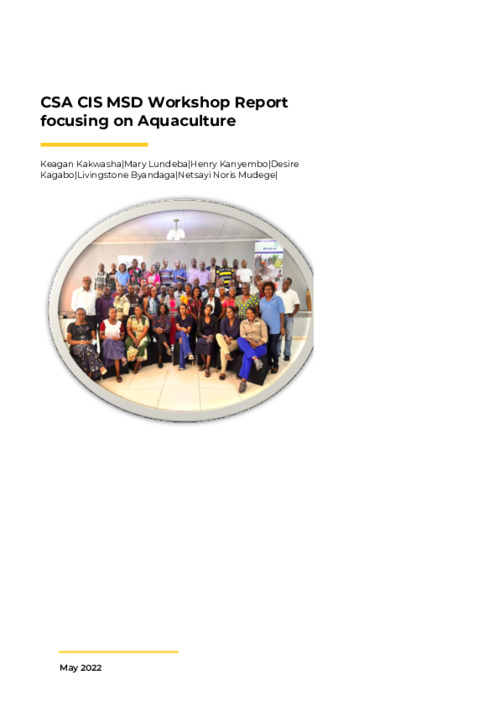Please use this identifier to cite or link to this item:
https://hdl.handle.net/20.500.12348/5604
CSA-CIS MSD workshop report focusing on aquaculture
| dc.creator | Kakwasha, K. | en_US |
| dc.creator | Lundeba, M. | en_US |
| dc.creator | Kanyembo, H. | en_US |
| dc.creator | Kagabo, D.M. | en_US |
| dc.creator | Mudege, N. | en_US |
| dc.date.accessioned | 2023-08-15T16:35:21Z | |
| dc.date.available | 2023-08-15T16:35:21Z | |
| dc.date.issued | 2022 | en_US |
| dc.identifier.citation | Keagan Kakwasha, Mary Lundeba, Henry Kanyembo, Desire Kagabo, Netsayi Mudege. (30/5/2022). CSA-CIS MSD workshop report focusing on aquaculture. Zambia: AICCRA. | en_US |
| dc.identifier.uri | https://hdl.handle.net/20.500.12348/5604 | |
| dc.description.abstract | WorldFish in collaboration with the International Water Management Institute (IWMI) hosted a multi-stakeholder dialogue (MSD) platform in the auspices of aquaculture. The workshop was held in Mansa, Luapula Province on 28th April 2022. Seventy-eighty (31% women) participants attended the workshop. AICCRA Zambia launched an MSD in February 2022 to share ideas on how to scale CSA CIS innovations. The workshop in Mansa was one in a series of meetings planned for the AICCRA Zambia CSA CIS MSD platform. This particular MSD workshop focused on aquaculture and particularly discussed issues related financing smallholder farmers and SMEs in the face of climate change, bench marking and credit worthiness of a smallholder fish farmers, and sharing practical experiences from integrated fish farms, aquaculture development association of Zambia (ADAZ) and the banks. In addition, we held a field visit to an integrated fish farm in Samfya district of Luapula province. The theme of the MSD was on Aquaculture markets (input and output) and financial access and inclusion. Representatives from the following institutions: Aquaculture Development Association of Zambia, Mpeni fish farm, Luapula provincial fisheries officer, NATSAVE, and Agribit business presented on various topics related to the aquaculture value chain. Presenters shared ideas and experiences along the value chain and experiences regarding access to fish markets and farmed fish productivity and profitability. The presentations generated discussion among the participants of the MSD. Mpeni Fish farm shared lessons and experiences on integrated aquaculture agriculture. The farm has eight fish ponds with an average size of 800m2 each, a banana plantation at 8 acres, and other crops and livestock, including dairy cattle, goats, sheep, poultry, piggery, assorted fruits and vegetables. The farm uses an off-grid solar plant as the primary source of power and stressed that this has significantly reduced the cost of production as it is off-grid and, at the same time, reduced disruption of production resulting from power cuts from the national grid. Mpeni fish farm also emphasized the need to use green technologies such as solar energy and practice better management practices such as high-quality seed/fingerlings and feeds. The presentation by Mpeni generated discussion around fisheries standards to ensure that smallholder farmers were given access to high quality and resilient fingerlings from hatchery operators. Other issues that were discussed included water licenses and fish species zoning. SMEs discussed that the water management authority (WARMA) had introduced water rights, and the fees for getting the license were not clear for commercial and non-commercial users. Regarding fish species zoning, the farmer representatives wondered why the government continued not allowing farmers in the north to farm fish species such as Oreochromis niloticus, which have fast growth compared to Oreochromis macrochir and tanganicae. SMEs insisted that Oreochromis macrochir, and tanganicae species were neither good nor commercially viable. Participants expressed that Oreochromis niloticus gave commercial players an upper hand in the aquaculture markets and hence were able to lower the price of farmed fish at the peak of competition, which affected smallholders. | en_US |
| dc.format | en_US | |
| dc.language | en | en_US |
| dc.publisher | AICCRA | en_US |
| dc.rights | CC-BY-NC-4.0 | en_US |
| dc.subject | life below water | en_US |
| dc.subject | climate adaptation and mitigation | en_US |
| dc.title | CSA-CIS MSD workshop report focusing on aquaculture | en_US |
| dc.type | Report | en_US |
| cg.contributor.funder | International Center for Tropical Agriculture | en_US |
| cg.contributor.project | Accelerating Impacts of CGIAR Climate Research for Africa -ZAMBIA | en_US |
| cg.coverage.country | Zambia | en_US |
| cg.coverage.region | Eastern Africa | en_US |
| cg.subject.agrovoc | aquaculture | en_US |
| cg.subject.agrovoc | Fish | en_US |
| cg.contributor.affiliation | WorldFish | en_US |
| cg.contributor.affiliation | Rwanda Agriculture and Animal Resources Development Board | en_US |
| cg.identifier.status | Open access | en_US |
| cg.contribution.worldfishauthor | Kakwasha, K. | en_US |
| cg.contribution.worldfishauthor | Lundeba, M. | en_US |
| cg.contribution.worldfishauthor | Kanyembo, H. | en_US |
| cg.contribution.worldfishauthor | Mudege, N. | en_US |
| cg.description.theme | Sustainable aquaculture | en_US |
| cg.creator.id | Keagan Kakwasha: 0000-0002-8646-9154 | en_US |
| cg.creator.id | Mary Lundeba: 0000-0001-8274-0800 | en_US |
| cg.creator.id | Netsayi Mudege: 0000-0002-0389-1967 | en_US |
Files in this item
This item appears in the following Collection(s)
-
Sustainable aquaculture [2735]
